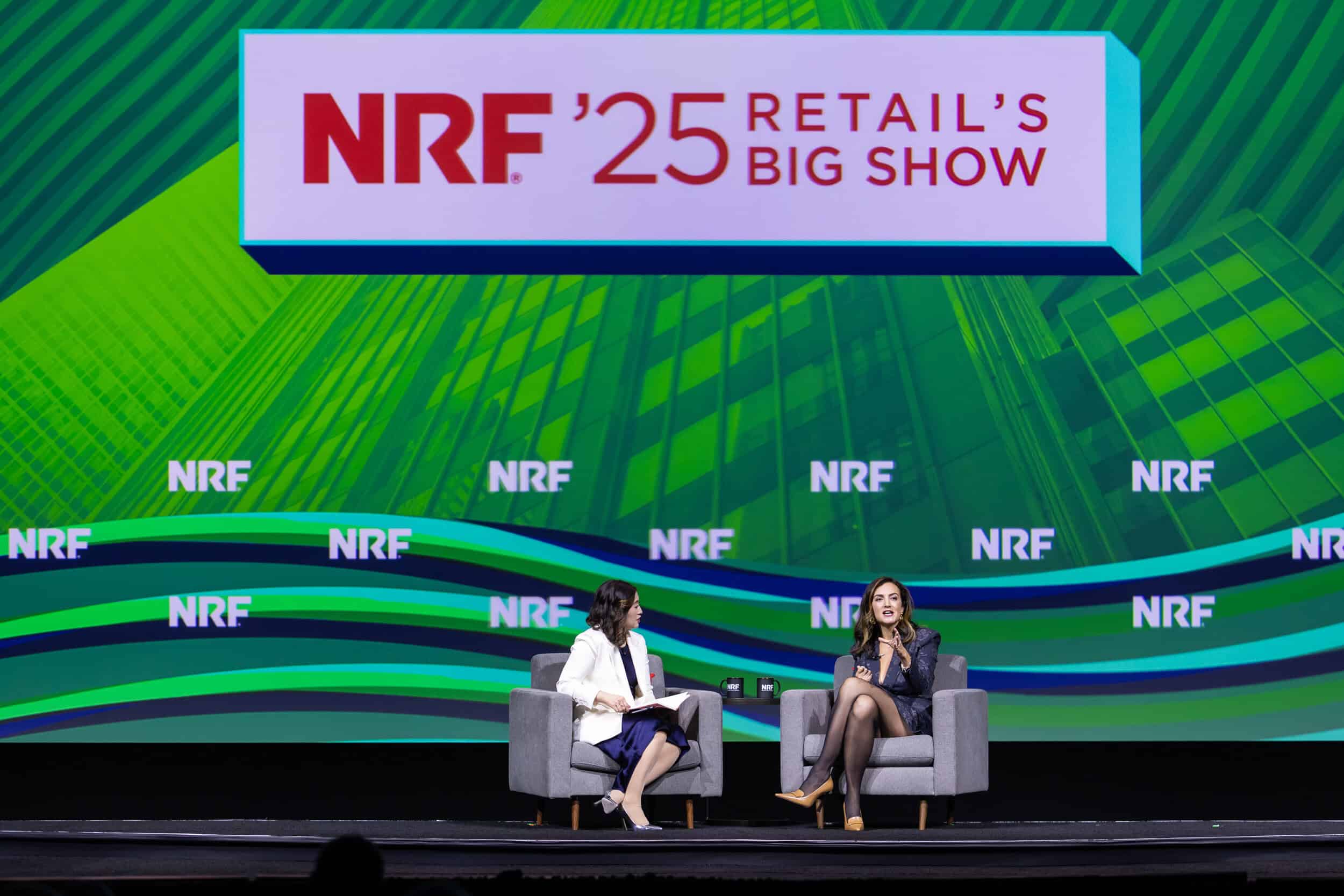
Image Courtesy of NRF Big Show 2025 – Jason Dixson Photography
January 20, 2025
Are Luxury Prices Way Too High?
At the 2025 NRF Big Show, Jennifer Hyman, CEO and co-founder of Rent the Runway, lamented that the surge in prices of luxury items over the last few years is “actually taking people out of the fashion industry entirely. Their money is now going into other things.”
She noted, for example, that prices on a Chanel handbag have almost doubled, while sticker prices on many items across LVMH’s portfolio of brands, which include Christian Dior, Louis Vuitton, Fendi, Bulgari, Celine, and Tiffany, have soared between 80% and 100%.
“It’s insane, even for a wealthy person,” said Hyman. “A wealthy person going into a store and buying a $6,000 handbag, they’re done with it. They think it is ridiculous. They would rather spend that money now on a vacation or in a restaurant or maybe on beauty or health and wellness.”
She said the success in fashion circles of brands such as Farm Rio and Quince that embrace quality and affordability shows that high-net-worth individuals have also become savvier shoppers.
“The consumer is not as snobby as she was 20 years ago or 30 years ago,” said Hyman. “Like 20 or 30 years ago, if you were rich, you only wore luxury goods. You only shopped in specific stores. You only went to Bergdorf. Now, if you’re rich, you’re smart. You’re like, ‘I’m gonna buy some of my stuff at Bergdorf and I’m gonna buy some of my cashmere at Quince.”
She added, “If you look at price point, you’re like, ‘That’s absurd. I’d rather spend that money at the Four Seasons.’ So, I think that fashion has priced itself out.”
Luxury brands have been increasing prices to offset rising inflationary pressures related to the pandemic, but the price hikes have also been used as a lever to grow revenue and profit as unit volumes decline due to a downturn in discretionary spending as well as weakness in China.
The Wall Street Journal reported in November 2024 that while designer brands have historically increased their prices at twice the rate of overall inflation, strong demand at the height of the pandemic enabled brands “to raise prices much faster than the increase in their own cost base.”
The average U.S. price of global luxury goods is up 61% versus 2019, according to retail intelligence firm EDITED.
McKinsey in a recent report said it believes the price increases in luxury “have reached a ceiling” and are hurting demand from aspirational luxury consumers that the consultancy sees as critical to growth for luxury brands.
As noted by The Business of Fashion, Mulberry, Burberry, and Capri are among luxury brands that recently admitted that rampant price inflation has also caused demand to sag even with their well-heeled clientele.
Bain’s annual luxury study estimates that luxury brands have lost more than 10% of their usual customer base since 2022 as “global luxury consumers, grappling with macroeconomic uncertainty and continued price elevation by brands, cut back slightly on discretionary items.”
“Customers don’t recognize themselves anymore in the luxury price-value equation,” Federica Levato, Bain partner and report co-author, told Vogue Business. “In the past, you bought exquisite high-quality products at a premium price with excellent customer experience and that was luxury. Now, some of these pieces are broken.”
The WSJ said that while some brands known foremost for quality, citing Hermès and Brunello Cuccinelli, continue to do well, the primary beneficiaries of the spike in luxury prices have been “cheaper labels and the resale market.”
In November, Mulberry, the UK fashion brand, announced plans to reduce the prices of most of its luxury handbags to less than £1,095 ($1,383) to broaden its appeal and revive sales. Mulberry’s new CEO Andrea Baldo told Bloomberg, “We were asking the customer for a little bit too much. In reality, we are becoming a kind of value for market in the luxury space.”
LVMH’s financial director, Jean-Jacques Guiony, on a recent earnings call said that introducing more affordable products risks diluting the exclusivity of the fashion house’s brands and margin erosion. He said, “I think it would be a mistake. We have to stay true to what we are.”
Discussion Questions
Has the spike in prices of luxury goods alienated both aspirational and high-net-worth shoppers?
Do you agree that the luxury shopper is “not as snobby as she was 20 years ago or 30 years ago”?
Will reducing prices offer more benefits in stimulating demand or risks to a luxury brand’s value perception?
Poll
BrainTrust
Georganne Bender
Principal, KIZER & BENDER Speaking
Gary Sankary
Retail Industry Strategy, Esri
Neil Saunders
Managing Director, GlobalData
Recent Discussions








From our research, prices for luxury items have risen sharply over recent years – more so than for middle-market products and at a higher rate than inflation. This has made luxury less accessible for some income cohorts, especially those in lower to middle groups. Luxury growth has previously relied on pulling in more customers from down the income spectrum, and these price increases have curtailed that trend. Quite whether luxury brands think this as an issue remains to be seen. However, reducing prices substantially isn’t really on the cards both because brands have to cover their own cost increases, and because luxury isn’t primarily about accessibility – quite the opposite.
But isn’t this, often, by design? As for the relationship to inflation, while I don’t doubt your numbers, I believe it’s ultimately not really relevant: what matters is the growth in income of the target – presumably wealthiest – groups…that, too, is higher than inflation.
Yes, that’s precisely the point I make at the end of my comment: “…luxury isn’t primarily about accessibility – quite the opposite.”
As for inflation, price increases in luxury have outpaced income growth from lower and middle income consumers who occasionally buy/bought into the category. It has not outpaced income growth from higher cohorts: but for the wealthiest consumers it has never been about actual affordability, it’s about perceived value.
Customers, regardless of their income level, are smart.
Wealthy consumers know when they are getting hosed and have backed off in acquiring luxury goods. Aspirational buyers have turned to resale, and younger consumers to dupes. The spike in luxury pricing is a classic case of biting the hand that feeds you.
It depends on the type of product, the brand, and the price history of any given product whether upscale consumers or premium shoppers will even notice price spikes, especially if they are not frequently purchasing the item or brand.
When the price seems unreasonable, they may switch to another brand or product. In addition, the shopper might compare prices at other stores. They may, however, be willing to pay more for the product if they are loyal to the brand. Ultimately, it depends on the needs, wealth, and priorities of the individual shopper.
People would be less likely to purchase the product if its price were twice what it was a year or two ago. However, many consumers will pay any price for a prestige brand, especially if it’s trendy.
Snobbiness is alive and well, no question about that. Alienating aspirational shoppers is sort of the point for many of these brands. Reducing prices and making these brands more accessible to the rest of us dilutes their brand panache and will no doubt elicit some backlash. But, there are limits; the value prop quality and service have to deliver as well, or even the most discerning snob will walk away.
High prices combined with a hard to get product equals luxury, right? Of course the product has to be desirable too, or have a brand value that states you are “it”.. or something like that.
As for shoppers attitudes, From a cultural standpoint that changes often, and is challenging to predict. For every wealthy individual seen on aisle 9 at WalMart there is someone not so wealthy dreaming about how to afford the Mercedes payments-so how are we to figure that out?
From my perspective forget $6,000 handbags, I mean lower that by, say 20% and you still are in for $4,800.
Charge what the market will bear and leave it alone.
The Chinese market is looking at collapse (as well as substitution by homegrown / CCP-promoted brands), while Japan and Korea are stagnant. Big chunk of your market goes “poof” but you’re still paying for all that high street real estate; at some point the basics of economics are going to swat LVMH if they keep their noses so far up in the air.
The absurd price hikes in luxury goods have alienated both aspirational and wealthy shoppers. Paying absurd prices for a bag or jacket, even if you’re wealthy, feels insulting when the value doesn’t match. I agree that luxury shoppers today are smarter, not snobbier as they’ll mix high-end with affordable because it’s practical. As for lowering prices, I think brands that stubbornly cling to high prices risk losing relevance. Reducing prices can absolutely boost demand if done thoughtfully, without compromising quality, something what Hermès gets right by sticking to quality and exclusivity.